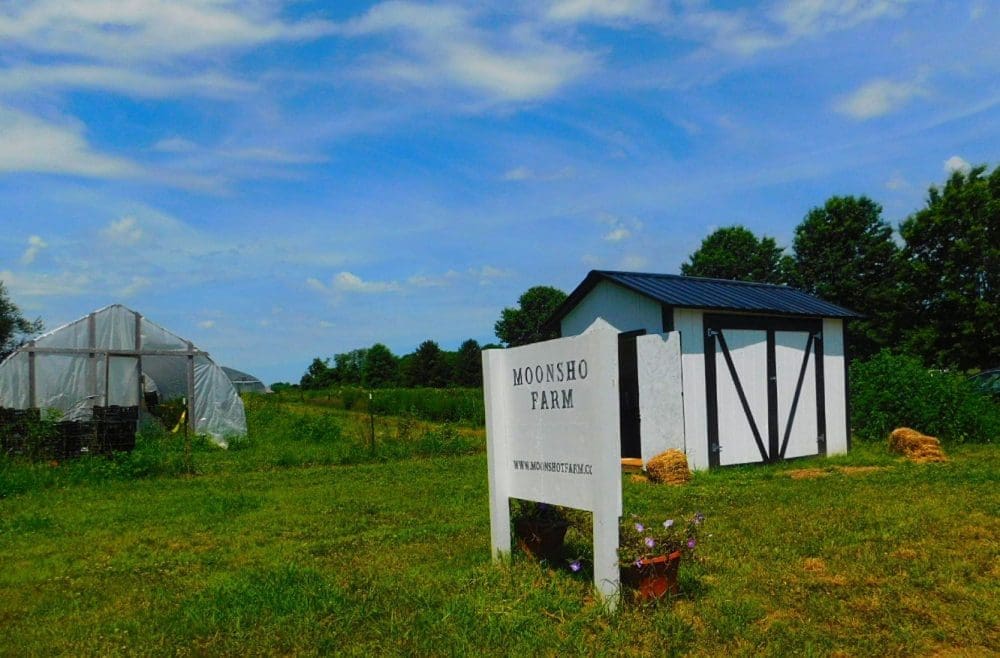We all know that New Jersey is nicknamed the “Garden State.” When that phrase comes to mind, most people probably think of produce. Currently, there are about 9,900 farms operating in New Jersey, with an average farm size of about 76 acres. There are about 6,400 flower growers in the entire United States. The US imports about 81% of the fresh-cut flowers originating primarily from Columbia and Ecuador. The flower industry is about a $57 billion market. There is opportunity hidden within these figures – for those with a vision and a dream.
It All Began in Brooklyn
Moonshot Farm, located in East Windsor, New Jersey, is a small family-owned farm that is uniquely positioning itself to be a leader in the sustainable specialty cut flower market. Opened in 2019, this working farm owned by Rebecca Kutzer-Rice and Mark Ginsberg has an interesting origin story and strong guiding business principles.
Six years ago, Rebecca was living in Brooklyn and working in technology when she met Mark, employed as a carpenter. They fell in love and had a little home in Brooklyn they referred to as “The Farm,” where they kept bees and chickens, and tended to a small garden.
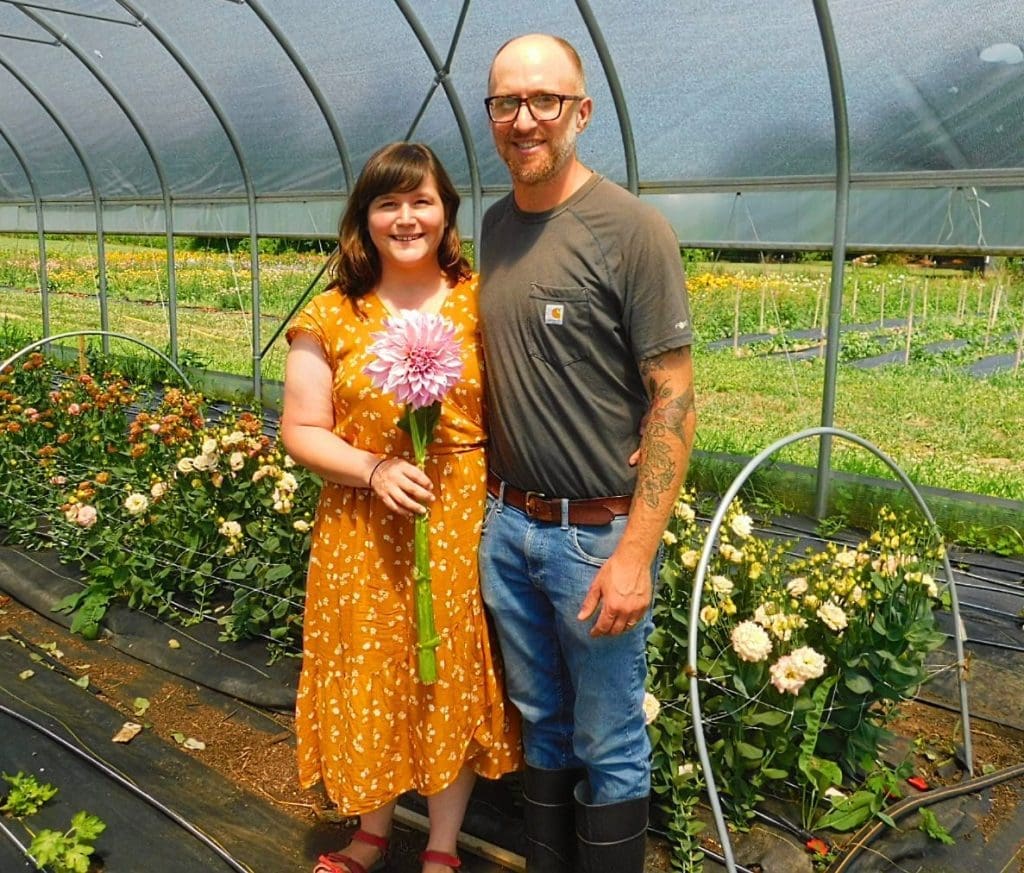
Over to the Jersey Side
In the fall of 2018, their first daughter, Rose, was born. They both agreed having land and open spaces were something they wanted for their children, so in Jan. of 2019, they began looking toward New Jersey for farmland.
East Windsor, NJ, is a suburban community about an hour’s train ride from New York City. It is populated mostly by housing subdivisions, but the outer edges of this town of about 27,000 still contain many working farms. Lee Turkey Farm has been in business in the township for seven generations, providing fresh produce and Thanksgiving turkeys to the community for decades. When Rebecca and Mark found an old Christmas tree farm with a house, a beautiful old red barn and nine and a half acres of land in April of 2019, they deemed it the perfect spot to “shoot for the moon” and launch Moonshot Farm.
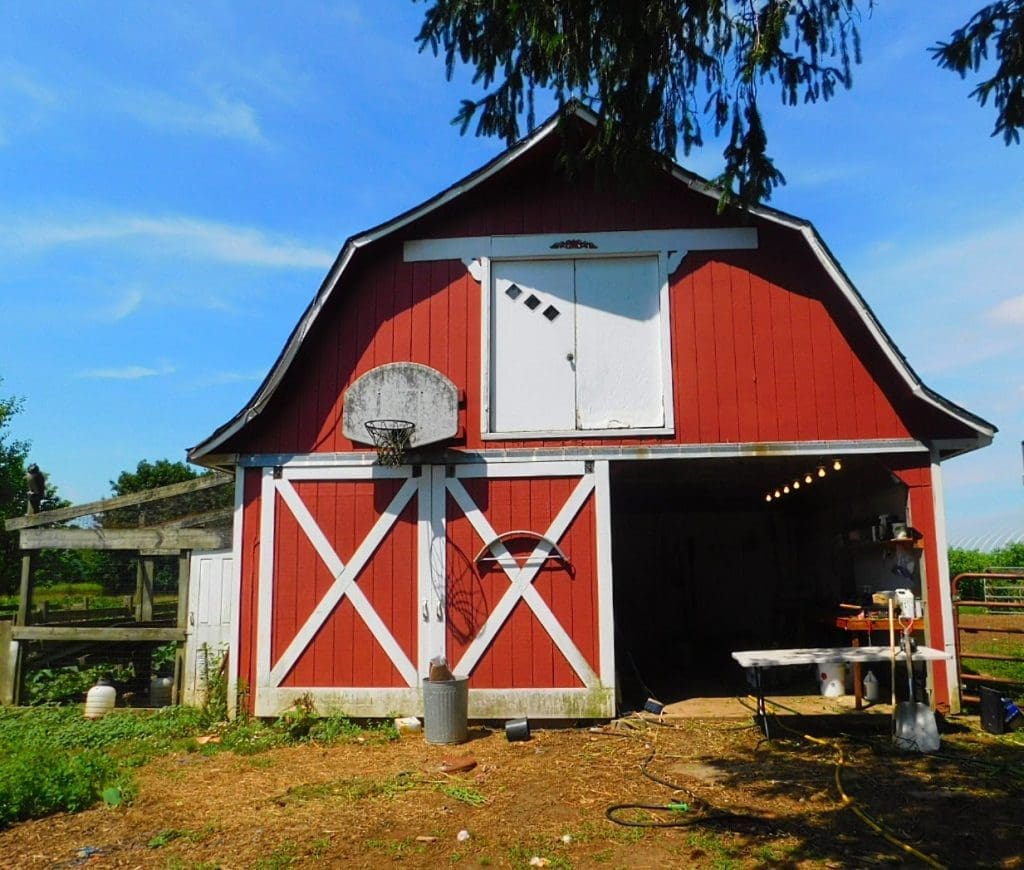
Learning to Grow
They began as a small homestead. Rebecca and Mark were not born farmers – they had to learn. They began selling eggs off their front porch, and experimenting with crops like flowers, garlic and blueberries. The flowers took off and they started learning about growing responsibly and sustainably. Both Mark and Rebecca have learned and leveraged every available resource out there to maximize the success of their farm. They worked closely with the Rutgers Extension Agency to get help with crop rotation planning. The Association of Specialty Cut Flower Growers (ASCFG) granted them a mentorship. Rebecca is now also well on her way to becoming a Master Beekeeper.
All this collaboration, mentoring and self-teaching enabled this young start-up farm to grow from its small porch sales stand to becoming a commercial-scale specialty flower farm in 2021 with an acre dedicated to the flowers. The flowers are pesticide and toxic chemical free. They use beneficial insect releases to control unwanted bugs. They consciously incorporate “good” plants to attract the pollinators and other insects desired to organically control damage to flowers. Natural packaging is used for all the bouquets and everything leaving the farm is compostable. It should be noted that in March of 2022 they welcomed their second daughter, Violet to the farm. As the family expands, so do the variety of flowers.
In Bloom
Their current business model is direct to consumer and retail. Moonshot Farm is an active participant at the highly successful West Windsor Farmers Market, open Saturdays year-round. They also have special events from time to time at the farm; there’s a U-pick, flower arranging classes always sell out, farm tours were offered for CSA members this year and there’s holiday wreath making.
Leveraging the Community Supported Agriculture (CSA) model, they began to offer a bouquet-of-the-month subscription in 2021. Every month for 6 months from April through September a gorgeous seasonal bouquet is prepared. The first year twenty-five people signed on. This year the one hundred and twenty spots sold out and there is a waiting list. In 2023, the couple plans to offer the subscription year-round. The farm currently has three employees to assist with harvesting and preparation of these popular bouquets. The Farm Stand out front is open every Sunday and almost always sells out.
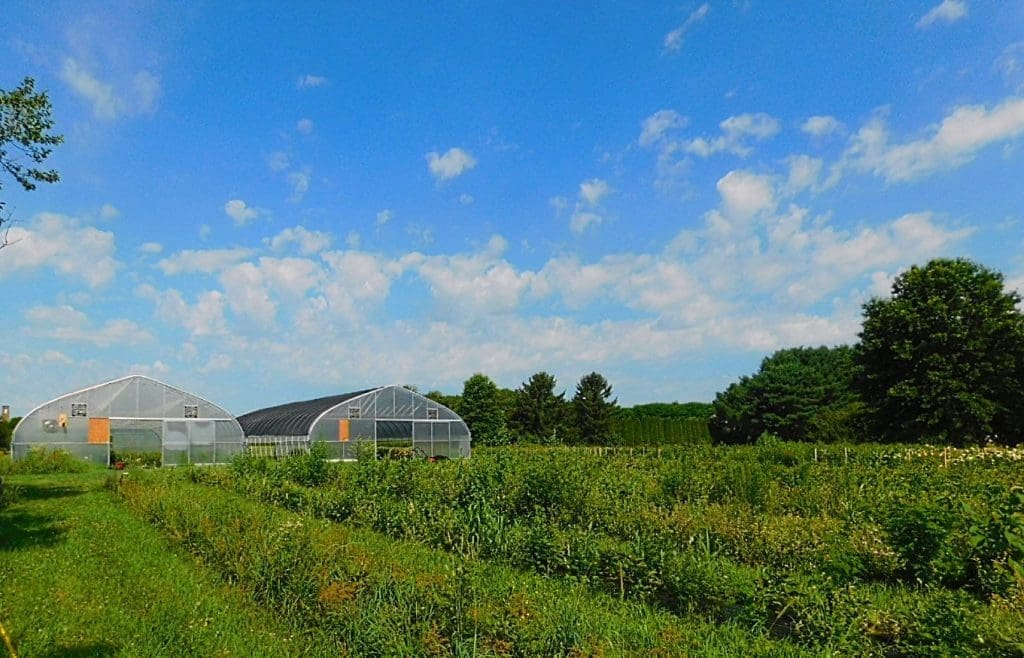
It sounds like these two kids from Brooklyn are on to something, right? Recall for a moment the timing of when they started this enterprise, just before Covid shut everything down. Using her marketing chops, Rebecca successfully leveraged social media via Facebook and Instagram to let the surrounding community know they were here and open for business. By upping their game both in acquiring the necessary farming skills, collaborating with local resources and focusing on high-quality, specialty blooms – Moonshot Farm has been able to establish a name and a presence in the local business community and gain consumer loyalty very quickly.
Having Wishes Granted
The biggest collaboration, however, is just about to begin for Moonshot Farm. The USDA has awarded them a grant through the Rural Energy for America Program (REAP) to convert their primary greenhouse to geothermal heating.In keeping with their vision of a sustainable farm with a low carbon footprint, the geothermal alternative is ingenious. Construction is slated to start this Fall and they will become one of the first commercial geothermal greenhouses for cut flowers in the country. Imagine fresh cut local flowers on the table at Christmas, or instead of red roses flown from other climates – how about a stunning Valentine’s Day bouquet of local flowers grown with minimal environmental impact? I’m already trying to imagine what the first winter CSA might look like in the dreary days of late Jan.
Moonshot Farm is now classified as Preserved Farmland. These lands have certain rules and regulations that must be followed. It is currently the smallest Preserved Farm in Mercer County. But the size should not fool you. This farm is a powerhouse poised to expand, grow and flourish.. They have been actively partnering with other local businesses to complement synergies. Old Hights Brewery has hosted special markets for local vendors, including Moonshot Farm, whose honey and spruce tips have also been used in the brewery’s beer. The Arts Council of Princeton made the vases for the farm’s CSA, and Moonshot Farm is hosting a wreath workshop at the Arts Council this winter. Jammin’ Crepes of Princeton is a pick-up location for the CSA.
Flower Power
Besides a commitment to responsibly growing specialty flowers, Rebecca and Mark also share a commitment to having their business reflect their values. They feel they have an ethical responsibility. They recently created their own Jars for Joy Program. They have donated bouquets to Ukrainian community centers, food pantries, gun safety groups and Planned Parenthood offices. They have hosted sunset yoga on the farm to support the National Black Farmers Association. They have the courage of their convictions and they are not afraid to face any backlash for believing in causes dear to their hearts.
Flowers in December
Summer is flying by quickly now. Some small farms are thinking about the fall crops and the winter break no doubt. But not at Moonshot Farm. They have tens of thousands of tulips, freesia, ranunculus, and anemones planned and visions of seeing flowers in Winter we have never been able to see before – the first year-round Flower CSA in the state!
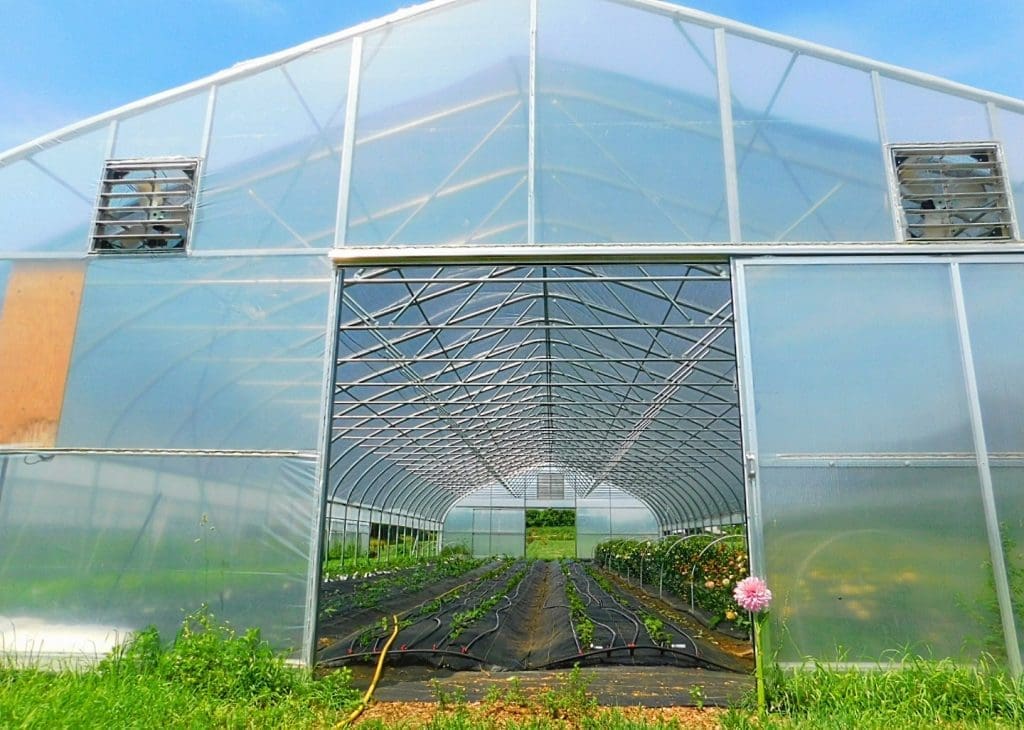
I love living in the Garden State. Our tomatoes are second to none. Some of the most delicious and most beautiful things are grown here in our Jersey soil. Besides serving as a source for pollinators, flowers add so much to our lives. The beauty, the aroma, the simple gift between friends – flowers are special and add so much to our natural and sensory environment. This new breed of ethical farming is a welcome trend here. I hope more young farmers take up the call and we move the needle away from the agri-business machine. My friends at Moonshot Farm ask us a simple favor, think about the impact of our buying habits; human, environmental and ethical. Do we need to get just a few varieties of flowers that transport well grown and flown a continent away? The idea of shopping local has never made more sense; and never been more beautiful.
Sue graduated from Rutgers University with a B.A. in English back when you could still get a degree for reading great literature. She spent nearly 40 years working in the Sales & Marketing field with companies ranging from non-profits to small businesses to Fortune 100 Corporations. Most recently retired after nearly 20 years with S & P Global, she is now free to pursue her true passions for hiking, writing and photography. Sue was born and raised in New York State. As a New Jersey transplant, her passion for the special blend of culture and nature that is uniquely Jersey is what Sue loves to share with the world. She has one grown son that she is insanely proud of. Her husband of many decades is an amazing partner both in life and hiking. When not out exploring, Sue is most likely at home reading a novel with her dog.
- Sue Fajgierhttps://thedigestonline.com/author/sfajgier/
- Sue Fajgierhttps://thedigestonline.com/author/sfajgier/
- Sue Fajgierhttps://thedigestonline.com/author/sfajgier/
- Sue Fajgierhttps://thedigestonline.com/author/sfajgier/


